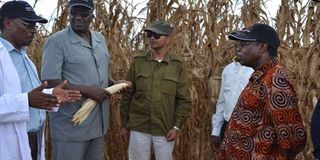Government satisfied with progress at Galana Kulalu maize irrigation project

From left: Vision 2030 Director General Julius Muia, board member Denis Awori, Irrigation PS Patrick Mwangi and other officials during an assessment tour of the Galana/Kulalu irrigation project on November 29, 2016. Mr Mwangi expressed his satisfaction with the progress of the project. PHOTO | FAROUK MWABEGE | NATION MEDIA GROUP
What you need to know:
- Mr Mwangi said those who are suggesting that the government should continue importing maize are not being realistic.
- The PS said so far the project has covered 2,500 acres from which 75,000 bags of maize have been produced.
- He emphasised that if the project is scaled up to produce 100,000 bags, there will be no need to import maize.
- Mr Denis Awori said in such a big project, challenges and criticisms are always expected.
The Principal Secretary in the Ministry of Water and Irrigation Patrick Mwangi has expressed his satisfaction with the progress of the Galana/Kulalu food security project being undertaken by the government in Tana River.
This comes amid criticism from opposition leaders that the project has failed to meet its intended objective.
They say it is better for the government to instead continue importing maize from other countries.
Addressing journalists Tuesday after conducting a tour of the project, Mr Mwangi said those who are suggesting that the government should continue importing maize are not being realistic.
He noted that every year, the government spends an average of Sh15 billion to import maize among other food items, but with the production at Galana, five to 10 per cent of the need can be addressed.
“This is a highly profitable and realistic project where the returns are even higher than even real estate projects in Nairobi which take over 10 to 20 years to get returns,” he said.
The PS said so far the project has covered 2,500 acres from which 75,000 bags of maize have been produced.
He emphasised that if the project is scaled up to produce 100,000 bags, there will be no need to import maize.
VALUE FOR MONEY
“For those who are in doubt I would like to tell them to sit down and do their calculations and they will see that, indeed, there is value for money,” he said.
Director General of Vision 2030 Julius Muia said the Galana/Kulalu food security project fits the bill in terms of where Kenya wants to go as a country because it is transformative.
Mr Muia added that agriculture is the second most important project of the economic pillar of Vision 2030 after tourism.
“This project by design is large, complex and transformational. A project of this size does not happen in a day, so basing on what we have seen it proves the government can deliver,” he said.
Similarly, Mr Denis Awori, a member of the Vision 2030 board, said in such a big project, challenges and criticisms are always expected.
Mr Awori added that compared to small holder farmers who cater for about 70 per cent of production in the country, food security only comes from large scale farming.
“Let me say that we came and we saw and indeed we are pleased by what we have seen. A lot of challenges have been overcome,” he said.
Separately, the general manager of National Irrigation Board, Gitonga Mugambi, said by April 2017, the area under irrigation at Galana is expected to be 10,000 acres.





